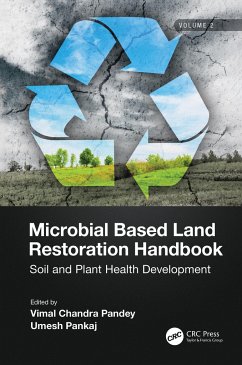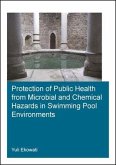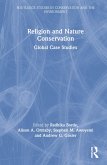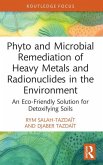Microbial Based Land Restoration Handbook, Volume 2
Soil and Plant Health Development
Herausgeber: Pankaj, Umesh; Pandey, Vimal
Microbial Based Land Restoration Handbook, Volume 2
Soil and Plant Health Development
Herausgeber: Pankaj, Umesh; Pandey, Vimal
- Gebundenes Buch
- Merkliste
- Auf die Merkliste
- Bewerten Bewerten
- Teilen
- Produkt teilen
- Produkterinnerung
- Produkterinnerung
Taking a multidisciplinary approach, this volume explores the role of plant microbes in ecological and agricultural revitalization beyond normal agriculture practices and offers practical and applied solutions for the restoration of degraded lands. It provides a comprehensive platform for soil scientist, agriculture specialists, ecologists.
Andere Kunden interessierten sich auch für
![Phytotechnology with Biomass Production Phytotechnology with Biomass Production]() Phytotechnology with Biomass Production83,99 €
Phytotechnology with Biomass Production83,99 €![Information Security Management Handbook, Volume 6 Information Security Management Handbook, Volume 6]() Information Security Management Handbook, Volume 668,99 €
Information Security Management Handbook, Volume 668,99 €![Managing Protected Areas Managing Protected Areas]() Managing Protected Areas143,99 €
Managing Protected Areas143,99 €![Protection of Public Health from Microbial and Chemical Hazards in Swimming Pool Environments Protection of Public Health from Microbial and Chemical Hazards in Swimming Pool Environments]() Yuli Ekowati (IHE Institute for Water Education, Delft, The NetherlProtection of Public Health from Microbial and Chemical Hazards in Swimming Pool Environments66,99 €
Yuli Ekowati (IHE Institute for Water Education, Delft, The NetherlProtection of Public Health from Microbial and Chemical Hazards in Swimming Pool Environments66,99 €![Oceanography and Marine Biology Oceanography and Marine Biology]() Oceanography and Marine Biology247,99 €
Oceanography and Marine Biology247,99 €![Religion and Nature Conservation Religion and Nature Conservation]() Religion and Nature Conservation174,99 €
Religion and Nature Conservation174,99 €![Phyto and Microbial Remediation of Heavy Metals and Radionuclides in the Environment Phyto and Microbial Remediation of Heavy Metals and Radionuclides in the Environment]() Rym Salah-TazdaitPhyto and Microbial Remediation of Heavy Metals and Radionuclides in the Environment33,99 €
Rym Salah-TazdaitPhyto and Microbial Remediation of Heavy Metals and Radionuclides in the Environment33,99 €-
-
-
Taking a multidisciplinary approach, this volume explores the role of plant microbes in ecological and agricultural revitalization beyond normal agriculture practices and offers practical and applied solutions for the restoration of degraded lands. It provides a comprehensive platform for soil scientist, agriculture specialists, ecologists.
Hinweis: Dieser Artikel kann nur an eine deutsche Lieferadresse ausgeliefert werden.
Hinweis: Dieser Artikel kann nur an eine deutsche Lieferadresse ausgeliefert werden.
Produktdetails
- Produktdetails
- Verlag: Taylor & Francis Ltd
- Seitenzahl: 292
- Erscheinungstermin: 7. Dezember 2022
- Englisch
- Abmessung: 162mm x 240mm x 25mm
- Gewicht: 620g
- ISBN-13: 9780367702243
- ISBN-10: 036770224X
- Artikelnr.: 64655976
- Herstellerkennzeichnung
- Libri GmbH
- Europaallee 1
- 36244 Bad Hersfeld
- gpsr@libri.de
- Verlag: Taylor & Francis Ltd
- Seitenzahl: 292
- Erscheinungstermin: 7. Dezember 2022
- Englisch
- Abmessung: 162mm x 240mm x 25mm
- Gewicht: 620g
- ISBN-13: 9780367702243
- ISBN-10: 036770224X
- Artikelnr.: 64655976
- Herstellerkennzeichnung
- Libri GmbH
- Europaallee 1
- 36244 Bad Hersfeld
- gpsr@libri.de
Dr. Vimal Chandra Pandey is internationally recognized in the field of Phyto management of polluted sites. Dr. Pandey is a CSIR-Pool Scientist at the Department of Environmental Science, Babasaheb Bhimrao Ambedkar University, Lucknow, India. He also works as a Consultant at CSTUP and DST-Young Scientist at the Plant Ecology and Environmental Science Division, CSIR-National Botanical Research Institute, Lucknow, India. He is a recipient of a number of awards, honors, and fellowships such as CSTUP-Young Scientist award, DST SERB-Young scientist award, UGC-Dr. DS Kothari Postdoctoral Fellowship. He is a Member of IUCN-CEM Ecosystem Restoration, Agro-ecosystems, South Asia, and a member of the BECT's Editorial Board. He has published more than 52 peer-reviewed articles and 37 book chapters. He is the author and editor of four books published by Elsevier. His high-quality research papers have good citations and have been cited worldwide by researchers within a short period of time. He is also serving as a potential reviewer for several journals from Elsevier, Springer, Wiley, Taylor & Francis etc. Dr. Umesh Pankaj is a Teaching and Research Associate in the Microbiology Department at Rani Lakshmi Bai Central Agricultural University, Jhansi, India. His doctoral degree in Microbiology was awarded from Jawaharlal Nehru University, New Delhi. His area of research is mainly focused on the phytoremediation of salt-affected soil using halotolerant Bio-inoculants like PGPRs and Arbuscular Mycorrhiza Fungi. Currently, he is working on Biofertilizers used for sustainable development. He has published 11 research articles in peer reviewed international journals and 5 book chapters. He has received Young Microbiologist Award from Agro-Environmental Development Society, Uttar Pradesh and Best Poster Award from ICAR-Indian Institute of Sugarcane Research, India. He is a life member of various scientific societies.
Chapter 1. Role of Soil Microorganisms in Sustainable Crop Production,
Chapter 2. Microbial Mediated Molecular Mechanisms to Cope-up Salinity and
Drought Stress in Plants , Chapter 3. Role of Arbuscular Mycorrhizal Fungi
in Horticultural Crops: Gains and Provocations, Chapter 4. Endophytes and
Their Role in Managing Degraded Land and Enhancing Food, Fodder, Fuel and
Fiber Production , Chapter 5. Microbial Strategies for Improving the Food
Crop Productivity Under Salinity and Drought, Chapter 6. Secondary
Metabolites: Stress Busters for the Development of Resilience in Plants to
Sustainable Agriculture, Chapter 7. Bacillus-based Biocontrol: Practical
Applications for Sustainable Agriculture, Chapter 8. Recognizing Insight
Interaction, Adaptation & Potentialities of Phyllosphere Microbiome Under
Various Distress Towards Sustainable Plant Growth, Chapter 9. Importance of
Bio-fertilizers in Turmeric (Curcuma Longa): Prospects and Challenges,
Chapter 10. Role of Soil Organisms in Maintaining Soil Health, Chapter 11.
Recent Advances in Potentiality of Microbes in Promoting Plant Growth and
Managing Degraded Land , Chapter 12. Productivity Losses Through
Bio-deterioration in Water Deficit Harvested Sugarcane, Chapter 13.
Bio-inoculants: the Potential Microbes for Restoration of Degraded Soil
Chapter 2. Microbial Mediated Molecular Mechanisms to Cope-up Salinity and
Drought Stress in Plants , Chapter 3. Role of Arbuscular Mycorrhizal Fungi
in Horticultural Crops: Gains and Provocations, Chapter 4. Endophytes and
Their Role in Managing Degraded Land and Enhancing Food, Fodder, Fuel and
Fiber Production , Chapter 5. Microbial Strategies for Improving the Food
Crop Productivity Under Salinity and Drought, Chapter 6. Secondary
Metabolites: Stress Busters for the Development of Resilience in Plants to
Sustainable Agriculture, Chapter 7. Bacillus-based Biocontrol: Practical
Applications for Sustainable Agriculture, Chapter 8. Recognizing Insight
Interaction, Adaptation & Potentialities of Phyllosphere Microbiome Under
Various Distress Towards Sustainable Plant Growth, Chapter 9. Importance of
Bio-fertilizers in Turmeric (Curcuma Longa): Prospects and Challenges,
Chapter 10. Role of Soil Organisms in Maintaining Soil Health, Chapter 11.
Recent Advances in Potentiality of Microbes in Promoting Plant Growth and
Managing Degraded Land , Chapter 12. Productivity Losses Through
Bio-deterioration in Water Deficit Harvested Sugarcane, Chapter 13.
Bio-inoculants: the Potential Microbes for Restoration of Degraded Soil
Chapter 1. Role of Soil Microorganisms in Sustainable Crop Production,
Chapter 2. Microbial Mediated Molecular Mechanisms to Cope-up Salinity and
Drought Stress in Plants , Chapter 3. Role of Arbuscular Mycorrhizal Fungi
in Horticultural Crops: Gains and Provocations, Chapter 4. Endophytes and
Their Role in Managing Degraded Land and Enhancing Food, Fodder, Fuel and
Fiber Production , Chapter 5. Microbial Strategies for Improving the Food
Crop Productivity Under Salinity and Drought, Chapter 6. Secondary
Metabolites: Stress Busters for the Development of Resilience in Plants to
Sustainable Agriculture, Chapter 7. Bacillus-based Biocontrol: Practical
Applications for Sustainable Agriculture, Chapter 8. Recognizing Insight
Interaction, Adaptation & Potentialities of Phyllosphere Microbiome Under
Various Distress Towards Sustainable Plant Growth, Chapter 9. Importance of
Bio-fertilizers in Turmeric (Curcuma Longa): Prospects and Challenges,
Chapter 10. Role of Soil Organisms in Maintaining Soil Health, Chapter 11.
Recent Advances in Potentiality of Microbes in Promoting Plant Growth and
Managing Degraded Land , Chapter 12. Productivity Losses Through
Bio-deterioration in Water Deficit Harvested Sugarcane, Chapter 13.
Bio-inoculants: the Potential Microbes for Restoration of Degraded Soil
Chapter 2. Microbial Mediated Molecular Mechanisms to Cope-up Salinity and
Drought Stress in Plants , Chapter 3. Role of Arbuscular Mycorrhizal Fungi
in Horticultural Crops: Gains and Provocations, Chapter 4. Endophytes and
Their Role in Managing Degraded Land and Enhancing Food, Fodder, Fuel and
Fiber Production , Chapter 5. Microbial Strategies for Improving the Food
Crop Productivity Under Salinity and Drought, Chapter 6. Secondary
Metabolites: Stress Busters for the Development of Resilience in Plants to
Sustainable Agriculture, Chapter 7. Bacillus-based Biocontrol: Practical
Applications for Sustainable Agriculture, Chapter 8. Recognizing Insight
Interaction, Adaptation & Potentialities of Phyllosphere Microbiome Under
Various Distress Towards Sustainable Plant Growth, Chapter 9. Importance of
Bio-fertilizers in Turmeric (Curcuma Longa): Prospects and Challenges,
Chapter 10. Role of Soil Organisms in Maintaining Soil Health, Chapter 11.
Recent Advances in Potentiality of Microbes in Promoting Plant Growth and
Managing Degraded Land , Chapter 12. Productivity Losses Through
Bio-deterioration in Water Deficit Harvested Sugarcane, Chapter 13.
Bio-inoculants: the Potential Microbes for Restoration of Degraded Soil








